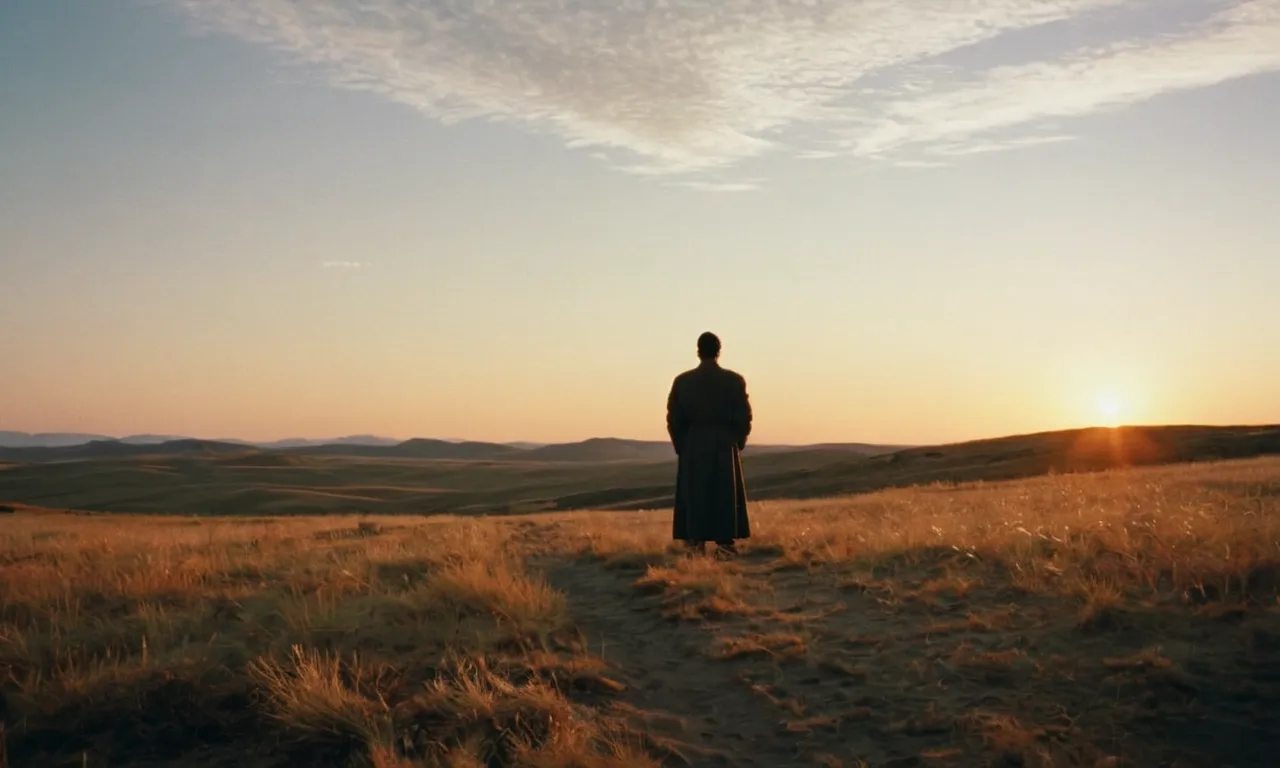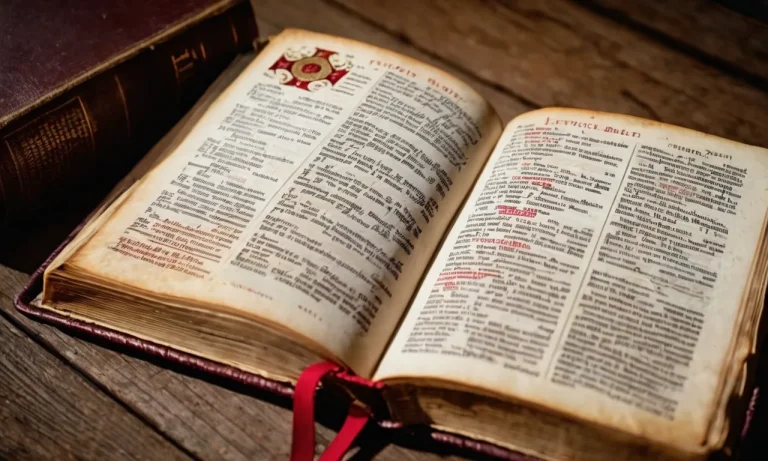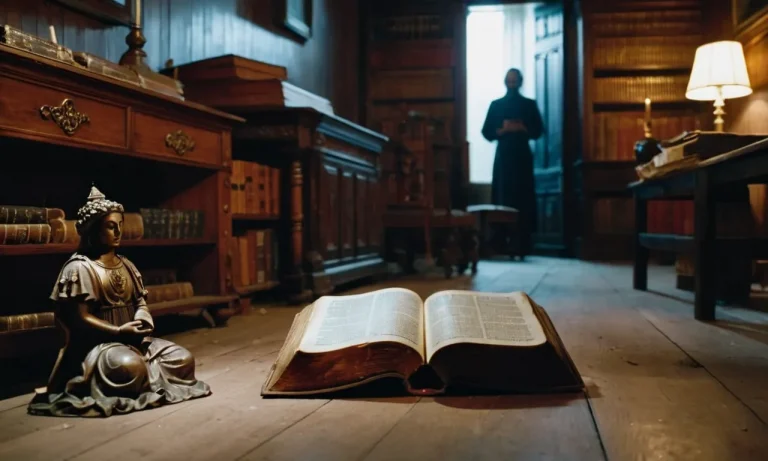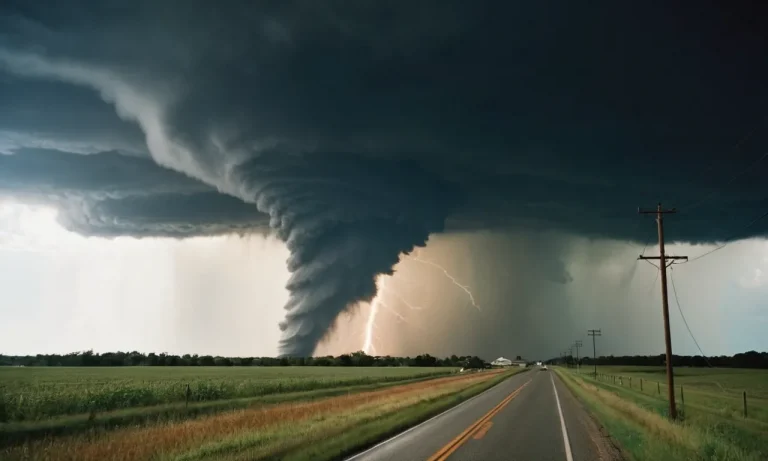Who Was With God In The Beginning At Creation Of The World?
Since the beginning of time, humanity has pondered the mysteries of creation and existence. At the center of it all is one fundamental question: who was with God in the beginning at the creation of the world?
If you’re short on time, here’s a quick answer to your question: according to Judeo-Christian belief, only God existed in the beginning. He created the heavens, the earth, and everything in them in six days. However, this topic has more complexity than meets the eye.
In this comprehensive article, we will examine Biblical accounts of creation, analyses by religious scholars throughout history, and perspectives from other belief systems to uncover who or what was present at the dawn of time when God created the heavens and the earth.
The Biblical Account of Creation
Genesis 1 States God Alone Created the Heavens and Earth
The book of Genesis 1 in the Bible clearly states that God alone created the heavens and the earth. The passages specify “God” as the creator, using the Hebrew word “Elohim” which refers to the one supreme God. There is no indication of anyone else involved in the creative acts.
This rules out any room for misinterpreting Genesis 1 as saying the creation was done by multiple gods or angels.
Clarifying the Plural Pronoun “Us” in Genesis 1:26
Genesis 1:26 says “Then God said, ‘Let us make mankind in our image, in our likeness’…”. The plural pronoun “us” has led some to wonder if other beings were with God at creation. However, scholars widely agree the plural here refers to the triune God – the Father, Son, and Holy Spirit.
God speaking as a plural being does not mean anyone else was there when he created the universe.
Examining Other Old Testament Passages About Creation
Additional Old Testament verses reinforce that God alone created the heavens and the earth by his wisdom and power, without mentioning any others involved:
- “By the word of the Lord the heavens were made, their starry host by the breath of his mouth.” (Psalm 33:6)
- “Where were you when I laid the earth’s foundation? Tell me, if you understand… Have you commanded the morning since your days began, and caused the dawn to know its place?” (Job 38:4,12)
- He who builds his lofty palace in the heavens and sets its foundation on the earth, who calls for the waters of the sea and pours them out over the face of the land—the Lord is his name. (Amos 9:6)
These majestic passages depict God constructing the universe by himself through his divine wisdom and authority over all creation. No Biblical text states anyone else was present assisting God in the grand genesis of the cosmos.
Historical Perspectives on Creation
Early Jewish Writers Emphasize God’s Solitude at Creation
The early Jewish writers tended to emphasize God’s solitude and uniqueness during the creation of the world. For example, the book of Isaiah in the Hebrew Bible states, “I am the Lord, and there is no other; besides me there is no god” (Isaiah 45:5).
This strict monotheism viewed God as the sole, omnipotent Creator who needed no helpers or lesser divine beings when bringing the universe into existence.
The Trinity in Christian Thought
In contrast to early Jewish conceptions, the mainstream Christian perspective believes that God exists as a Trinity – God the Father, Jesus Christ the Son, and the Holy Spirit. According to this view, all three persons of the Trinity were involved in the work of creation.
The Gospel of John states, “In the beginning was the Word, and the Word was with God, and the Word was God. He was with God in the beginning” (John 1:1-2). Here, “the Word” refers to Jesus Christ who Christians believe was present with God at the creation.
Islamic View of God’s Oneness at Creation
Islam’s doctrine of tawhid (oneness of God) is closely aligned with Judaism’s view. The Quran declares, “Your God is One God; there is no god but He, the Compassionate, the Merciful” (Quran 2:163). This absolute monotheism allows for no other beings to share in God’s unique creative power.
An oft-quoted passage emphasizes God’s solitary majesty: “He begets not, nor was He begotten, and none is His equal” (Quran 112:1-4).
Alternative Viewpoints from Other Religions
Hindu Cosmology Posits Many Gods Involved in Creation
Hinduism conceives of creation as the work of multiple deities rather than a single God. The trimurti or triple deities of Brahma, Vishnu, and Shiva are seen as responsible for the creation, maintenance, and destruction of the universe in an endless cycle over immense spans of time.
Other Hindu gods like Indra and Agni are also mentioned in roles assisting with cosmic creation.
According to Hindu scriptures, before creation there was only formless water and Lord Vishnu sleeping on the cosmic serpent Shesha in this water. When it was time, the lotus sprouted from Vishnu’s navel, revealing Brahma the creator seated on it.
Brahma then created the basic elements and set evolution in motion. The universe goes through cycles of creation and destruction, with one day of Brahma equivalent to billions of human years.
Buddhist Concept of Eternal Universe Without Creator
Buddhism generally conceives the universe and its natural laws as eternal, without beginning or end. The Buddha discouraged speculation on the origin of the world, considering it not spiritually productive.
Many Buddhist philosophers denied a single moment of creation and instead proposed an infinite temporal series of universes and world systems.
In Buddhism, the focus is on achieving enlightenment and ending samsara or the endless cycle of birth and rebirth. As per Buddhist teachings, the universe evolves and dissolves continuously according to causal principles without need of an omnipotent creator deity overseeing it.
Daoist Belief in the Efficacy of the Natural World
In Daoism, the primordial universe arises from an interaction between yin and yang – two opposing and complementary natural forces that generate and sustain existence. There is no concept of an anthropomorphic all-powerful Creator according to Daoist cosmology.
The Daodejing’s notion of Dao as the source and ideal of existence is impersonal and sublime.
Daoism emphasizes living in harmony with the natural efficacy inherent in the world and universe rather than obedience to a transcendent God. Spontaneity, simplicity, and non-action are seen as Daoist virtues aligned with the generative forces underlying reality.
There is appreciation of the awe-inspiring yet amoral power of nature in Daoist philosophy.
Conclusion
The question of who was present at the beginning of creation yields a complex range of perspectives across religions and history. While Judeo-Christian tradition points to the solitariness of God at creation, nuances like the plurality in God and insights from Eastern faiths reveal the depths of this profound mystery.
Our exploration illuminates the diverse ways humanity conceptualizes the genesis of the cosmos and our place within it. While questions remain, this journey primes us to continue seeking truth about our origins with open and discerning minds.








